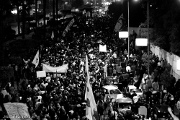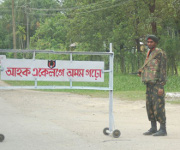 |
| Egypt protests near Presidential Palace (Photos courtesy of Moud Marthez) |
Egypt (MNN) ― The Muslim Brotherhood hoped that an overwhelming approval to the draft constitution would quiet the restive opposition.
However, that was not to be the case in either scenario. First, although the first round of voting has brought a 56% "yes" vote to the constitution, it isn't a done deal. Second, protestors have been packing the streets to show their discontent with the process.
Despite Islamist claims that a win proves they have a mandate, the opposition says the whole process has been rushed, there have been irregularities at the polls, and turnout: low. There may be enough to the accusations that the Justice Ministry has launched a probe investigating the allegations.
It's not over yet. Saturday's round covered 10 of Egypt's 27 provinces. The second round of voting is this Saturday.
Paul Estabrooks, a spokesperson for Open Doors, says a lot of Christians are doing what they can in the referendum. However, "They do have a sense of resignation, and we need to pray that God will overrule in the situation for them."
Why the concerns? Estabrooks explains, "The draft referendum, they say, is poorly crafted, is too Islamist, and they're afraid that this is going to bring even more persecution against the Christian minority there." More specifically, he notes, "This new draft that Mohammed Morsi is proposing gives the Islamic clerics a say over legislation and over civil liberties. This is the area where believers are most concerned."
Estabrooks goes on to compare the possibilities of a Sharia state to what Chinese Christians have experienced. "It's very much like the old days in China. Believers there were saying, ‘It's not so much the policy that Beijing sends out; it's how the local authorities implement it.'"
Concerns were heightened when President Mohammed Morsi awarded himself extra powers and an Islamist Parliament. Article 2 of the proposed constitution establishes Islam as the state religion. "Principles of Islamic Sharia are the principal source of legislation," it states. Article 219 spells out those principles as "general evidence, foundational rules, rules of jurisprudence, and credible sources accepted in Sunni doctrines and by the larger community." Article 44 outlaws blasphemy.
If it's approved in its current state, the constitution calls for a parliamentary election in early 2013. There are fears that the new parliament will consist of nothing but people who support the Sharia turn.
What's more, if the Islamists succeed in their gambit for power, believers expect even more harassment, oppression and outright persecution. "They hear the preaching every Friday from the mosques, where the local clerics sometimes can be far more strident in opposition to them than even the political leaders."
But will the opposition quit? That's unlikely. It's not Christians alone who oppose the shift to Islam, says Estabrooks. "There are a number of Muslim people who are also opposed to this constitutional draft because they see it as a negating of the whole Arab Spring initiation. It just transfers absolute power from one group to another."
However, some Christians believe that the recent wave of persecution has prompted many nominal Christians to turn to Christ for solace. It means hearts are united, and that, says Estabrooks, brings a sense of hope. "Believers are going to be in a situation where they have a wonderful opportunity to exhibit a Christ-like lifestyle and a response to what happens in their country. I think that's how we should pray, that first of all, we will be led and guided by the Holy Spirit in their responses, and that what they do will indeed reflect true Christian values."
Egypt is a nation in its birthing throes. Estabrooks says that Open Doors has had to adjust to changes almost as rapidly as the national believers do. He explains, "On the one hand, the way we were working before has been interrupted, of course, because of the instability. On the other hand, that has enabled us to distribute more Scriptures, more training materials, and more children's materials because of the spiritual growth that's occurring there."

.svg.jpg)


